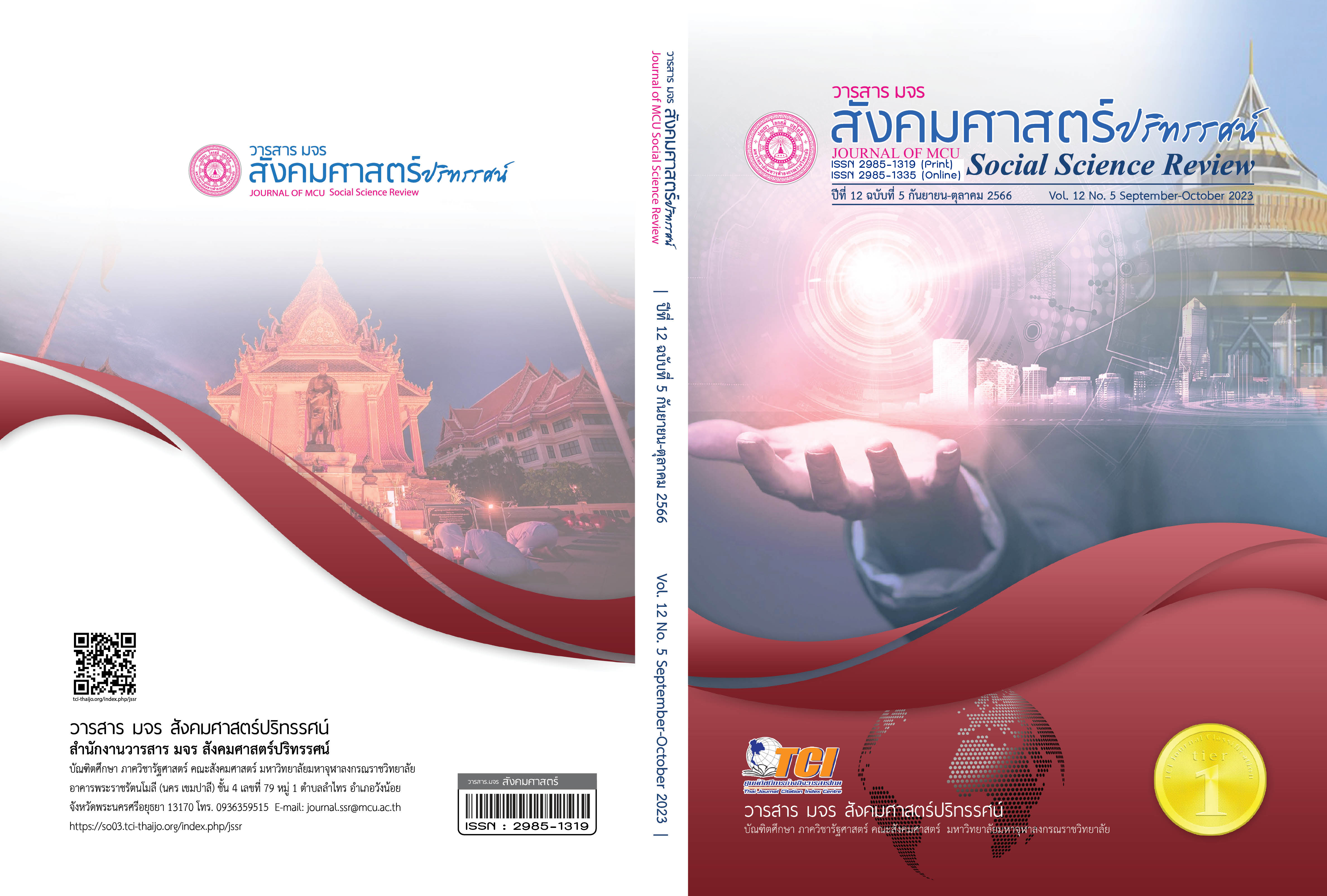การบูรณาการหลักพุทธธรรม เพื่อพัฒนาภาวะผู้นำ พระสังฆาธิการ กรุงเทพมหานคร
คำสำคัญ:
การบูรณาการหลักพุทธธรรม, การพัฒนา, ภาวะผู้นำพระสังฆาธิการบทคัดย่อ
บทความวิจัยนี้มีวัตถุประสงค์เพื่อศึกษา 1. หลักพุทธธรรมและทฤษฎีภาวะผู้นำเชิงสถานการณ์ เพื่อพัฒนาภาวะผู้นำพระสังฆาธิการ 2. คุณลักษณะภาวะผู้นำพระสังฆาธิการกรุงเทพมหานคร และ 3. นำเสนอการบูรณาการหลักพุทธธรรมกับทฤษฎีภาวะผู้นำเชิงสถานการณ์ เพื่อพัฒนาภาวะผู้นำพระสังฆาธิการกรุงเทพมหานคร เป็นวิจัยแบบผสานวิธี การวิจัยเชิงปริมาณ เก็บข้อมูลแบบสอบถามจากกลุ่มตัวอย่างพระสงฆ์ในกรุงเทพมหานคร จำนวน 389 รูป วิเคราะห์ข้อมูลด้วยสถิติ ค่าเฉลี่ย ค่าร้อยละ ค่าส่วนเบี่ยงเบนมาตรฐาน และสัมประสิทธิสหสัมพันธ์ การวิจัยเชิงคุณภาพ ใช้การสัมภาษณ์ผู้ให้ข้อมูลสำคัญ โดยเลือกแบบเจาะจง จำนวน 17 รูป/คน และสนทนากลุ่มเฉพาะจากผู้ทรงคุณวุฒิ จำนวน 8 รูป/คน วิเคราะห์ข้อมูลด้วยการวิเคราะห์เชิงเนื้อหา
ผลการวิจัยพบว่า 1. หลักพุทธธรรมทุติยปาปณิกสูตรมีโครงสร้างเดียวกับใจความในพุทธศาสนา ที่ให้แก้ปัญหาตามเหตุปัจจัยด้วยปัญญา และพบแบบสำรวจที่มีประสิทธิภาพของทฤษฎีสถานการณ์ เพื่อทำความเข้าใจจัดการปัญหาตามสถานการณ์ 2. พระสังฆาธิการกรุงเทพมหานคร มีคุณลักษณะผู้นำตามหลักทุติยปาปณิกสูตร และสถานการณ์ในงาน โดยรวมระดับปานกลาง พระสังฆาธิการมีภาวะผู้นำแบบผสมผสาน 3. การบูรณาการหลักพุทธธรรมต้องพัฒนาภาวะผู้นำพระสังฆาธิการ ระบบงาน ประยุกต์ศิลปะวิทยาการที่ก้าวหน้า เพื่อแก้ปัญหาภายนอกตามสถานการณ์ และพัฒนาภายในตามหัวใจของพระพุทธศาสนา
เอกสารอ้างอิง
กระทรวงศึกษาธิการ. (2540). คู่มือพระสังฆาธิการเรื่องการคณะสงฆ์และการศาสนา. กรุงเทพฯ: โรงพิมพ์ กรมการศาสนา.
กุลธิดา ลิ้มเจริญ. (2561). กระบวนการพัฒนาภาวะผู้นำเพื่อสันติภาพเชิงพุทธบูรณาการ (พุทธศาสตรดุษฎีบัณฑิต สาขาวิชาสันติศึกษา). พระนครศรีอยุธยา: มหาวิทยาลัยมหาจุฬาลงกรณราชวิทยาลัย.
ชูชัย สมิทธิไกร. (2532). ค้นหาความเป็นผู้นำและประสานให้เข้ากับสถานการณ์. กรุงเทพฯ:บริษัท ซีเอ็ดยูเคชั่น จำกัด.
ทนง ทศไกร. (2561). กลยุทธ์การพัฒนาภาวะผู้นำของผู้บริหารโรงเรียนประถมศึกษาตามหลักทุติยปาปณิกสูตร ในสำนักงานเขตพื้นที่การศึกษาประถมศึกษานครสวรรค์เขต 1 (พุทธศาสตรดุษฎีบัณฑิต สาขาวิชาพุทธบริหารการศึกษา). พระนครศรีอยุธยา: มหาวิทยาลัยมหาจุฬาลงกรณราชวิทยาลัย.
ธัญวิทย์ ศรีจันทร์. (2558). รูปแบบและกลยุทธ์การพัฒนาภาวะผู้นำในศตวรรษที่ 21 ของกรมการองค์กรนิสิตนักศึกษา (ครุศาสตรดุษฎีบัณฑิต สาขาวิชาอุดมศึกษา). มหาวิทยาลัยจุฬาลงกรณ์มหาวิทยาลัย.
ธิติวุฒิ หมั่นมี. (2558). หลักพุทธธรรมกับการบริหารในยุคโลกาภิวัตน์. สืบค้น 20 กรกฎาคม 2565, จาก https://www.gotoknow.org/posts/582135
พระธรรมโกศาจารย์ (ประยูร ธมฺมจิตฺโต). (2549). พุทธวิธีบริหาร. กรุงเทพฯ: โรงพิมพ์มหาจุฬาลงกรณราชวิทยาลัย.
พระมหาธฤติ รุ่งชัยวิทูร. (2556). รูปแบบการพัฒนาพระสังฆาธิการเพื่อประสิทธิภาพการบริหารกิจการคณะสงฆ์ (พุทธศาสตรดุษฎีบัณฑิต สาขาวิชารัฐประศาสนศาสตร์). พระนครศรีอยุธยา: มหาวิทยาลัยมหาจุฬาลงกรณราชวิทยาลัย.
พระมหานพพล กนฺตสีโล. (2557). การพัฒนาภาวะผู้นำของพระสังฆาธิการในการบริหารงานคณะสงฆ์ภาค 15 (พุทธศาสตรดุษฎีบัณฑิต สาขาวิชาการจัดการเชิงพุทธ). พระนครศรีอยุธยา: มหาวิทยาลัยมหาจุฬาลงกรณราชวิทยาลัย.
พระมหาศรณชัย มหาปุญฺโญ. (2556). การพัฒนาการบริหารกิจการคณะสงฆ์ของพระสังฆาธิการในยุคโลกาภิวัตน์ (พุทธศาสตรดุษฎีบัณฑิต สาขาวิชารัฐประศาสนศาสตร์). พระนครศรีอยุธยา: มหาวิทยาลัยมหาจุฬาลงกรณราชวิทยาลัย.
ระเบียบการปกครองคณะสงฆ์. (2541). วิทยาพระสังฆาธิการ 2. สืบค้น 2 มิถุนายน 2562, จาก http://www.watmoli.com/new/wittaya-two/1823/
สุนทร โคตรบรรเทา. (2560). ภาวะผู้นำในองค์การสถานศึกษา. กรุงเทพฯ: สำนักพิมพ์ปัญญาชน.
Yamane, T. (1967). Statistic: An Introductory Analysis. New York: Harper and Row.
ดาวน์โหลด
เผยแพร่แล้ว
รูปแบบการอ้างอิง
ฉบับ
ประเภทบทความ
สัญญาอนุญาต
ลิขสิทธิ์ (c) 2023 วารสาร มจร สังคมศาสตร์ปริทรรศน์

อนุญาตภายใต้เงื่อนไข Creative Commons Attribution-NonCommercial-NoDerivatives 4.0 International License.
เพื่อให้เป็นไปตามกฎหมายลิขสิทธิ์ ผู้นิพนธ์ทุกท่านต้องลงลายมือชื่อในแบบฟอร์มใบมอบลิขสิทธิ์บทความให้แก่วารสารฯ พร้อมกับบทความต้นฉบับที่ได้แก้ไขครั้งสุดท้าย นอกจากนี้ ผู้นิพนธ์ทุกท่านต้องยืนยันว่าบทความต้นฉบับที่ส่งมาตีพิมพ์นั้น ได้ส่งมาตีพิมพ์เฉพาะในวารสาร มจร สังคมศาสตร์ปริทรรศน์ เพียงแห่งเดียวเท่านั้น หากมีการใช้ภาพหรือตารางหรือเนื้อหาอื่นๆ ของผู้นิพนธ์อื่นที่ปรากฏในสิ่งตีพิมพ์อื่นมาแล้ว ผู้นิพนธ์ต้องขออนุญาตเจ้าของลิขสิทธิ์ก่อน พร้อมทั้งแสดงหนังสือที่ได้รับการยินยอมต่อบรรณาธิการ ก่อนที่บทความจะได้รับการตีพิมพ์ หากไม่เป็นไปตามข้อกำหนดเบื้องต้น ทางวารสารจะถอดบทความของท่านออกโดยไม่มีข้อยกเว้นใดๆ ทั้งสิ้น





